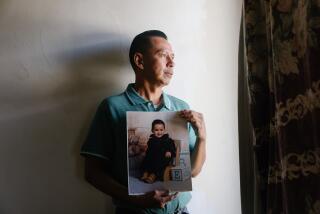Recovery Mission : Azusa Boy, 6, Struggles to Cope With Pain, Fear After Losing an Arm in Encounter With a Lion
- Share via
From the middle of his big hospital bed, 6-year-old Jesse Ontiveros takes command.
“This is Jesse,” he says confidently when he answers the phone.
But let a white-coated doctor enter, and the thin boy with the big brown eyes begins to cry.
The reaction is understandable.
After losing his arm to a caged African lion in Mexico, after 12 hours of surgery and three additional unsuccessful operations to try to reattach the limb, and after a plane ride to Childrens Hospital in Los Angeles for more surgery, Jesse knows that the arrival of a doctor often means pain.
“It’s OK, mijo , it’s OK,” Felix Ontiveros, 41, of Azusa, says over and over again, using a Spanish endearment as he tries to calm his son.
For the next two to three weeks, this is the life Jesse faces as he struggles to recover from the freak accident that claimed his left arm from above the elbow.
Severed-arm accidents involving children are rare, said Dr. Susan Downey, a plastic surgeon. Such accidents occur most frequently to men in their 30s who work in carpentry or construction, she said.
But, Downey added, once Jesse undergoes surgery to close his mangled arm and an artificial arm and hand are attached, he will be able to resume the normal, active life of any growing child.
Still, the hurt and trauma are too fresh, too vivid for Jesse and his family to cope with at the moment.
“He’s always been a happy little boy, running, climbing trees, riding his bike,” said his mother, Sara. “It’s going to be hard for him, starting all over again.”
Jesse lost his arm June 27 on the first day of a fishing vacation at El Faro Beach, a trailer park near Ensenada, Mexico. The boy and his father, along with Jesse’s 18-year-old brother, Steve, had planned to stay in a friend’s trailer in return for making repairs to the structure, Felix Ontiveros said.
Once they arrived, the group set out for sodas at the trailer park store. Jesse spotted a caged lion, kept as an attraction about 20 feet from the door. The boy asked the store owner if the cat was tame.
“‘Oh, yeah, he’s tame. He’s real good,”’ Felix Ontiveros said the owner told the boy.
But when Jesse walked up and stuck his thin arm through the cage wires, it was violently snatched by the big cat’s jaws.
“It happened that quick,” said Felix Ontiveros, slapping his hands together.
By the time the father ran to his son, the boy’s arm was a bloody stump. Jesse’s hand and forearm lay in the dirt inside the cage, his father said.
The boy and his severed arm were rushed to a nearby military hospital for emergency surgery. But three days later Jesse’s arm began to turn blue from lack of circulation, and doctors performed three more surgeries during the next seven days, said Col. Francisco Javier Carvalho Soto, head of Del Cipres Region Military Hospital. The doctors took veins from Jesse’s legs to implant in the arm in an attempt to save it, but the efforts failed, Carvalho said.
Ten days after the accident, the boy was transferred to Childrens Hospital.
Felix Ontiveros blames the Mexican hospital for what he considers poor care. He said he wanted his son to go to the United States for surgery, but doctors insisted the boy remain in Mexico. Ontiveros believes the hospital experimented on his son, performing on him the first surgery of its kind at the facility.
Carvalho said doctors had no choice but to operate immediately to try to save the arm. Although a reimplant had never been done at the military hospital, the surgeons involved had performed the procedure elsewhere in Mexico. Surgery began within a half hour half-hour of the boy’s arrival, officials said.
The surgeon said the hospital lacks emergency air transportation and a trip by ambulance to the nearest U.S. hospital, in San Diego, could have taken as long as three hours.
Downey agreed that time is of the essence if reimplants are to be successful. Most surgeons recommend performing them within three hours of the trauma, before the severed tissue dies, she said.
Further, arm reimplants are successful only about 60% to 70% of the time, such as when the arm has been severed cleanly by a saw, machine or other tool, Downey said. In crush injuries, such as Jesse’s, the rate of success plummets, she said.
Felix Ontiveros said he is considering taking legal action against Romolo Molina Michel, the owner of the lion, which remains undisturbed in his cage. Michel could not be reached for comment.
More to Read
Sign up for Essential California
The most important California stories and recommendations in your inbox every morning.
You may occasionally receive promotional content from the Los Angeles Times.












